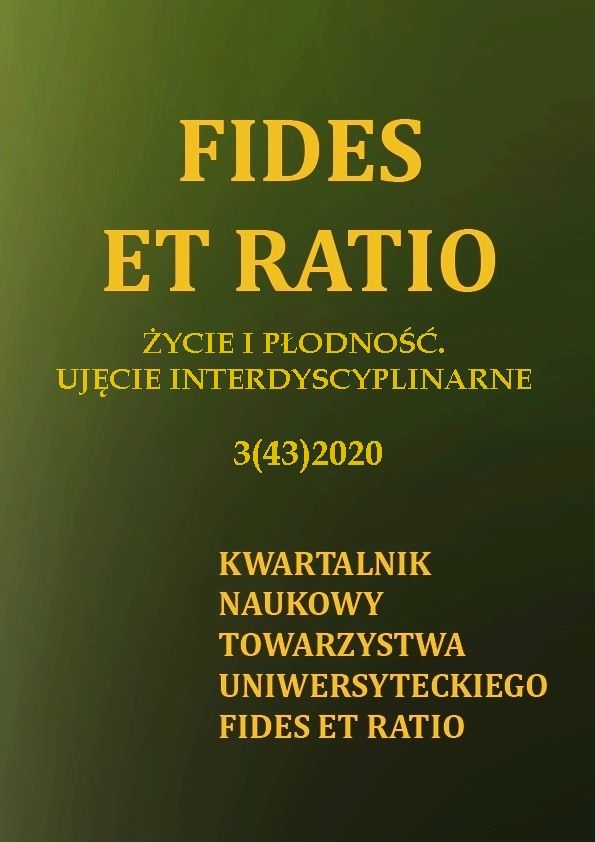Abstract
The article aims to analyse the children's right to the integral development of their own identity. A holistic approach to the dimensions of faith and reason in children's lives is a fundamental aspect that shapes their personality: who they are and who they will be in the future. The article discusses the basic rights of children, which are threatened by deliberate actions by left-liberal circles, targeting the young European generation of the 21st century. The above-mentioned rights are the inalienable right to life, to integral upbringing in the family, and to reliable education in the school environment. In addition, the right to spiritual development in the complex, i.e. Christian, approach.
It should not be manipulated by eclecticism, scientism, historicism, and pragmatism.
References
Alnach, K., Rusch, K. (1995). Rhetorik Erfolgreiche Gesprächsführung Redetechnik und Körpersprache mit Übungen und Musterreden, Munchen: Compact.
Beck-Gernsheim, E. (2002). Reinventing the Family. In Search of New Lifestyles, Cambridge: Polity.
Benedykt XVI. (2012). Kto broni Boga ten broni człowieka, (w:) A. Bujak, W. Chrostowski (red.). Dyktatura gender, 75-77, Kraków: Biały Kruk.
Borutka, T. (2000). Prawa osoby ludzkiej podstawą życia społecznego w świetlne nauczania Kościoła, Kraków: Wydawnictwo Naukowe PAT.
Borutka, T., Królczyk, M. (2018). Wychowanie religijne w rodzinie w świetle nauczania Kościoła, Bielsko-Żywieckie Studia Teologiczne, 19, 33-50.
Borutka, T., Zawada, S. (2005). Musicie być mocni w wierze. Przesłanie Papieża Jana Pawła II do współczesnego człowieka, Bielsko-Biała: Instytut Teologiczny im. św. Jana Kantego.
Butler, J. (1990). Feminism and The Subversion of Identity, United States of America: Routledge.
Chat, E. (2009). Religia w życiu człowieka, Sandomierz: WDS.
Gentile, E. (2006). La democrazia di Dio. La religione americana nell’era dell’impero e del terrore, Bari: Editori Laterza.
Gergen, K. (2000). An Invitation to Social Construction, London: Sage.
Guzowska, L. (2011). Duchowość ponowoczesna. Idee, perspektywy, prognozy, Rzeszów: Wydawnictwo Uniwersytetu Rzeszowskiego.
Hargie, O., Dickson, D. (2004) Skilled interpersonal communication, London: Routledge.
Huntington, S.P. (1996). The clash of civilizations and the remaking of word order, New York: Simon & Schuster.
Jan Paweł II. (1998). Encyklika Fides et Ratio, Rzym: Vatican.
Jan Paweł II. (1994). List do Rodzin. Gratissimam sane, Rzym: Vatican.
Jan Paweł II. (1981). Odpowiedzialność nauki i technologii, (w:) M. Radwan, T. Gorzkula,
K. Cywińska (red.), Wiara i kultura, 115-124, Rzym: Polski Instytut Kultury Chrześcijańskiej.
Jan Paweł II. (1979). Encyklika Redemptor homini, Rzym: Vatican.
Jelonek, T. (2012). Kultura grecka a Nowy Testament, Kraków: Petrus.
Kaliszuk, Z. (2016). Zmanipulowany umysł, Kraków: Wydawnictwo M.
Kiereś, H. (2001). Personalizm czy socjalizm. U podstaw życia społecznego, Radom: Polskie Wydawnictwo Encyklopedyczne.
Knop, J. (2018). Hermeneutyka reform – reforma hermeneutyki. Rozwój i odnowa Tradycji Kościoła, Warszawskie Studia Pastoralne, 1, 38, 205-218.
Legutko, R. (1994). Etyka absolutna i społeczeństwo otwarte, Kraków: Arcana.
Michelmann, H., Nayudu, P. (2006). Cryopreservation of human embryos, Cell and Tissue Banking, 7, 2, 135-141.
Neufeld, G., Mate, G. (2006). Unsere Kinder brauchen uns, Bremen: Genius.
Niewińska, A. (2014). Raport o gender w Polsce, Warszawa: Fronda.
Nykiel, M. (2014). Pułapka gender, Kraków: Wydawnictwo M.
Peeters, M.A. (2007). The globalization of the western cultural revolution, Rotterdam: Sense Publishers.
Reich, W. (1974). Psicologia di massa del facismo, Milano: Mondadori.
Ricoeur, P. (1969). Le Conflit des interprétations. Essais d'herméneutique, Paris: Le Seuil.
Rozwadowski, W. (1992). Prawo rzymskie. Zarys wykładu wraz z wyborem źródeł, Poznań: Ars boni et aequi.
Schwager, R. (2003). Religion erzugt Gewalt – Einspruch, Munster: LIT.
Schirrmacher, F. (2006). Minimum. Vom Vergehen und Neuenstehen unserer Gemeinschaft, Munchen: Pantheon.
Shonkoff, J., Philips, D. (2000). From Neurons to Neighborhoods. The Science of Early Childhood Development, Washington: National Academy Press.
Sikora, A. (2011). Życie ludzkie w fazie przedimplementacyjnej w dokumentach Rady Europy
w aspekcie moralnym, Poznań: Wydawnictwo Uniwersytetu im. Adama Mickiewicza.
Szczerski, K. (2017). Utopia europejska. Kryzys integracji i polska inicjatywa naprawy, Kraków: Biały Kruk.
Szymański, Ł. (2009). In vitro, Kraków: Petrus.
Ślipko, T. (2004). Zarys etyki ogólnej, Kraków: WAM.
Wiater, E. (2009). Naprotechnology. Ekonomia płodności, Kraków: Wydawnictwo eSPe.
Wojciechowski, M. (2005). Pochodzenie świata, człowieka, zła. Odpowiedź Biblii, Częstochowa: Edycja Świętego Pawła.

